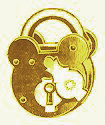THOMAS POOLE AND SONS, EZEKIEL LANE, SHORT HEATH, WILLENHALL
WILLIAM POOLE, COPPICE LANE, WILLENHALL
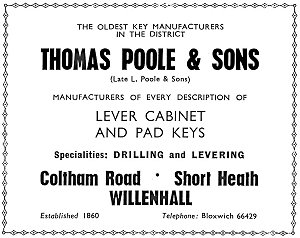 |
Originally the business was started by Levi Poole, a master
keysmith,
in 1860 in Swan Lane (Ezekiel Lane) and then later run by his two sons,
Thomas (b 1867) and William (b 1866). At some point the brothers split
up and started their own businesses under their own names.
William Poole had a key works in a large wooden building behind his
home in Coppice Lane, near its junction with Mill Lane. |
William died on
the 23 May 1930 while travelling on a bus or tram between Walsall and
Willenhall, while taking a parcel of keys to a customer. The business
was left to his wife and later to her sister. It was eventually sold to
A & E Squire in the 1940s, who used the premises as a small tool
room.
Thomas Poole and Sons was later run by William and Howard, the sons
of Thomas, until they retired and sold the business to Keys of Steel Ltd
(q.v.) in 1979.
They specialised in the supply of cast iron keys and blanks for
padlocks and cabinet locks.
(Ref. W Pace) (Street Names of Willenhall)
THE POWER LOCK CO, DEANS ROAD, WOLVERHAMPTON
Specialist in pad, cabinet, brass rim and mortice locks. In 1953/1987
were in Deans Road. Partner's Melvin Pitt and Mike Watkins (died early
1996). Later moved to new premises at Purbrook Road, East Park
Industrial Estate, Wolverhampton. Taken over by Paveford Ltd (owner Mr
Vaughan), a company on the same industrial estate, on 1st May
1997.
In August 2001 the company was being offered round the trade for
sale.
CYRUS PRICE AND CO LTD, BRITANNIA WORKS, WEDNESFIELD ROAD,
WOLVERHAMPTON.
|
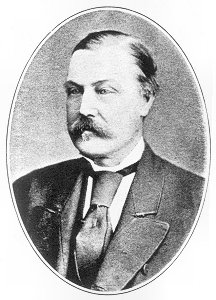
Cyrus Price
|
The firm was established in 1840, by Cyrus Price, as patent lock and fire
resistant safe manufacturers.
The company was written up in the industrial review
"Wolverhampton and South Staffordshire
Illustrated" in 1899. The information and quotations
below are taken from this publication.
The heading to this article underlines the word
"Cyrus" in the company's name, a device which the
company seems to have favoured to distinguish itself from George
Price (who similarly underlined the "George" in their
name).
The heading also refers to the company also being at London,
Liverpool and Dublin but does not specify the nature of this
representation. |
"As early as the International Exhibition held in London in
1862, Messrs Cyrus Price and Co., first placed their manufactures in
open competition with the world's leading makers, where the excellent
qualities of their Holdfast and fire-resisting safes and patent locks
gained the prize medal awarded for new and special improvements. In 1869
this success was repeated at Wolverhampton, and was followed by an award
of the only prize medal at Cardiff in 1888, and a gold medal for second
order of merit at Melbourne, 1888-89".
| Cyrus Price died in 1895 and the business became a
limited company with Walter Russell Baker as the Managing
Director and W. Vaughan as the other director. Both men
had been with the company for more than 25 years.
The review then goes on to describe the works: " The
premises occupied by the firm, known as the Britannia Safe and Lock
Works, are situated on the Wednesfield Road, within convenient access of
the Great Western, Midland, and London and North-Western Railways, where
a considerable area of ground is covered by extensive ranges of
substantial buildings of varying elevation, in which manufacturing
operations are carried out.Passing through the offices we notice a
handsome show case containing some splendidly finished samples of safe
locks and movements, the identical exhibit for which the firm gained the
award, previously mentioned, in 1862. |
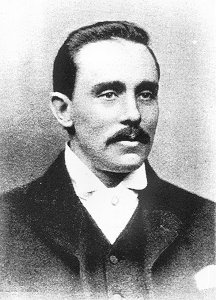
Walter Russell Baker
|
In the rear are spacious smiths'
forge, safe-making shop, locksmiths' and paint shops, with large store
for the steel and iron used in construction."
Then some of the company's products get a mention:
"In their latest type of
"Conqueror" and "Eclipse" safes, we were enabled to
realise the high stage of perfection attained by the firm in their most
recent improvements, in which are embodied all details of construction
best calculated to render them impregnable against' burglarious attacks.
We were also shown their Fire- Resisting 212 degree book safes, with
patent solid hardened steel and drill-proof doors, strong rooms, doors,
and frames, and smaller receptacles possessing equally efficient
qualities.
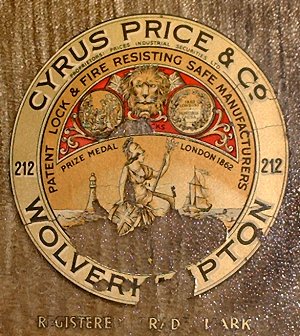 |
This large transfer is in
the Lock Museum. Note that, under the large lettering of
"Cyrus Price and Co", smaller lettering reads:
"Proprietors: Price Industrial Securities Ltd."
Presumably this is the name of the limited company formed in
1895. Cyrus Price & Co then became a trade name and
seems always to have been used. |
| Cyrus Price safe plate in
the Trevor Dowson collection. |
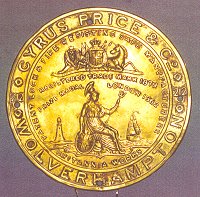
|
"In the lock department a noteworthy speciality is the patent
prize medal unpickable locks and street door latches, the invention of
the late Mr. Cyrus Price. Commenting on this improvement we may quote
the following extract from the Birmingham Daily Gazette in
dealing with the subject:- "The security of the new lock may
technically be said to consist of a double lever 'reflection' bolt,
standing against either side of the keyhole, which bolt, upon the
introduction of a false key or pick, not only prevents the lifting of
the levers (which is required before the main bolt can be drawn back) by
the action of a bolt-pin which slides into one side of the levers, but
with the same action it effectually bolts the bolt itself. The patentee
claims for his useful invention that the principle renders it almost
impossible for the lock to get out of order with ordinary wear and
usage."
"Other locks manufactured by the firm comprise the
"Champion" detector locks and night latches, cabinet, rim, and
mortice locks and bank locks, most of which are made in sets with a
"master key" to pass the whole.
"Before leaving this department
our attention was invited to the firm's First Class Quadruple Extra
Strong Holdfast double fire-resisting, drill, wedge and
crowbar-resisting safe, with massive doors 1 in. thick, intersected with
hardened drill-proof steel, hung on massive hinges, to shoot large bolts
all round, large dovetails in the doors, cut from the solid to prevent
wedging, for the use of bankers, pawnbrokers, and others requiring to
store bullion, plate and other valuables. A glance of [sic] this
ponderous stronghold would, we should imagine, deter the boldest burglar
from his nefarious design even when equipped with the best tools
employed by exponents of the "cracksman's" handicraft".
The review then summaries some of the many letters the
company had received about instances where their safes had resisted
burglars, fires and other attacks, including "the great fire at Beattie's
Drapery Stores, Wolverhampton" in 1897. And an "almost
unique experience may be told of a safe supplied by this firm to Mr.
William Jones, of Sand Quay, Belfast. In this case the attack was made
upon the safe in question by three burglars, who, being baffled in their
attempt on the "Holdfast" coolly proceeded to convey it to a
barge for transmission to a place where their operations could be
continued with greater security. During this performance the gang, owing
to some alarm, consigned the safe to the water, from which it was
subsequently rescued, and despite the duration of the immersion the
contents upon examination were found to be comparatively uninjured."
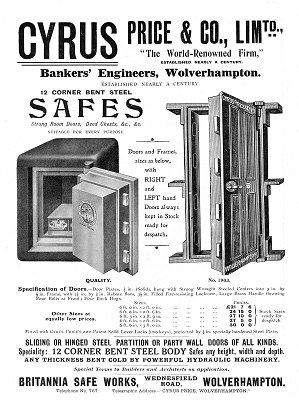 |
This advert, from an unknown source, refers to the
company being almost a century old and so should date from
the 1930s. It refers to "12 corner bent steel safes".
Can anyone explain the "12 corner" reference? By this time
they are also advertising strong room doors, deed chests,
and "sliding or hinged steel partition or party wall doors
of all kinds", suggesting a widening of their range.
They also say that the safes are "fitted with Cyrus
Price's own patent solid lever locks", suggesting that they
made their own, unlike many safe makers who bought in the
locking mechanism. |
Details of the firms history after this review are not
known at present but eventually the business was acquired by James
Gibbons (qv) in the 1930s.
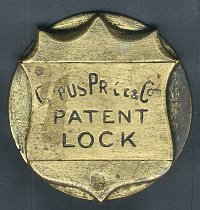
GEORGE PRICE, CLEVELAND SAFE AND LOCK WORKS, CLEVELAND STREET,
WOLVERHAMPTON

|
Read the history of George
Price |
W.H.PRITCHARD, NEACHELLS LANE, WEDNESFIELD, WOLVERHAMPTON
Manufacturers of a special two lever lock, specially made for fitting
into a cabinet/chest/box they make. Had a factory in Wolverhampton.
Were
taken over by Richards and Ross Ltd on the 4th January 1989
and production moved to their Neachells Lane site. Richards and Ross Ltd
is an engineering company that had been established in Wednesfield from
the 1930s.
QUALITY LOCK COMPANY
Founded by Peter Cartwright and Frank Constable (both former
employees of Erebus Ltd) in July 1971, in a garage in Frank Constable's
garden in St Anne’s Road. They made hand made rim, mortice and gate
locks, and also specialised in repairing old locks. Their original
equipment consisted of a single phase Black and Decker drill, their
first order for 200 upright brass mortice locks were all hand filed and
from the proceeds of this order they purchased a linishing machine.
After 18 months they moved into Rotunda works in Wood Street, which
they purchased from James Banks, whose business was incorporated into
Quality Lock, although they never made any of James Banks (q.v.) range
of locks. In c1989 they moved premises, this time moving into the works
formerly used by Thomas Worrall (q.v.) in Doctors Piece, although their
entrance is in Leve Lane. Frank Constable retired in December 1990,
leaving Peter Cartwright to continue to run the company employing 4
lockmakers.
They purchased from Erebus the manufacturing right of the old James
Gibbons range of locks and keys and they also produce locks to pattern,
brass ships locks, galley locks and furniture, galvanised gate locks,
fire escape locks, cell locks and hospital locks.

|

|
| Return to
Locks and Safes |
Return to
the list of makers |
|
